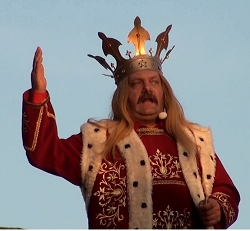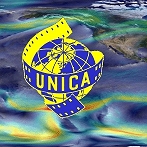
From Dave’s Notebook
September 2016
UNICA Suceava
Arrival
Endless darkness stretched ahead. A full moon hung above. A faint
buzz began in the distance. Young film crews tensed. Lenses turned
to the tiny lights in the sky. We stood on the runway, and watched
as the largest aircraft so far to come to Suceava landed. It was
named “Henri Coandă” after the Romanian pioneer of jet propulsion.
The passengers descended to be greeted by a tall Scotsman carrying a
sign marked “UNICA 2016”.
Thursday had begun with meetings and a press-conference, but for me
the huddle of kisses, hugs and handshakes on the airport tarmac
marked the true start of our event.
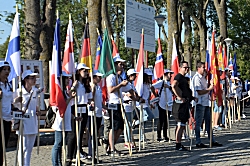
Opening Ceremony
Officially UNICA 2016 kicked off with a stunning, colourful ceremony at the town’s ruined citadel. We were met by young people bearing the flags of the thirty UNICA nations. In Olympic style we paraded down a wooden causeway, over the drawbridge to the castle’s portcullis. In traditional Romanian greeting, we were offered bread and salt. Then we were each personally welcomed by Ion Lungu, the mayor of Suceava. History re-enactment groups stationed medieval guards around the castle and demonstrated aspects of fortress life. The open-air courtyard was set out with seating like a theatre: stage and huge screen in front of us and ruined battlements all round.
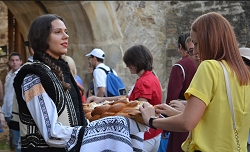
On screen were translated texts for the formal speeches. The 30 Young UNICA workshop participants from Switzerland, Sweden, Russia, Ukraine, Finland, France, Slovakia, the Netherlands, Germany and Romania were called on stage to take a bow. Then came the dancers and musicians.
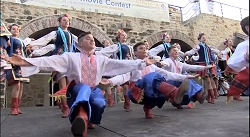
The feudal system survived in Romania well into the 19th century
preserving a peasant lifestyle. Until the end of 1989 the country
remained isolated under Ceauşescu. Thus traditional music and dance
was conserved. There were hints of Cossack in the dance styles.
Talented local soloists played violin and pan pipes. Then with a
flourish of baroque trumpets on the ramparts, the “ghost of Stefan
the Great”, Romania’s heroic king, appeared with his retinue to add
his welcome.
Bucovina Rock Castle
As we returned to our buses, pop bands started in the old, dry moat. A weekend rock festival had been stopped for a couple of hours to let our ceremony take place. As the music restarted, our cameras were busy.
If we were not already stunned by that welcome, the opening banquet
certainly knocked us out. Like all the formal meals we had in
Romania, it consisted of at least five courses, lots of wine,
spirits and music. We ended the night happy, bloated and
exhausted.
That did not stop us starting cheerfully the next day to watch films
in the Cinema Modern – totally renovated as a cultural film and
theatre venue for the city. The national programmes ran, the jury
delivered their comments and at the end of the week voted on the
awards. It all worked with very few hiccups.
There were two excursions. A full day was spent visiting some of the fresco-covered, Orthodox Christian Monasteries for which Bukovina is famous. A half day outing started with a visit to the town museum, which had re-opened just weeks earlier after a refit. Then the revelry was taken to a rural location for a barbecue meal with rides in horse-drawn carts and dancing in the meadows.
The General Assembly
The formal part of the congress was the General Assembly, held in
an imposing chamber. The reports were accepted and most matters
passed with little discussion … until we came to proposed changes to
the UNICA film competition.
Some member countries and lobbyists had circulated impassioned pleas
to keep UNICA as a forum for amateur films. They seemed not to
notice, that the committee proposals were to remove the “Young
Professionals” section – the only category which allows commercial
work to take part. The fuss they made provoked opposition and left
matters unresolved. A straw poll indicated 7 members for the
retention of “Young Professionals” and 7 against. The rest
abstained. Rules for the 2017 competition will be announced after a
committee meeting in late October.
There were problems, as at any large event. An irritating one was
with the receivers and headsets for hearing translations. At first
many flat batteries stopped them working. Then coverage in the
theatre and General Assembly venue was variable.
Young UNICA
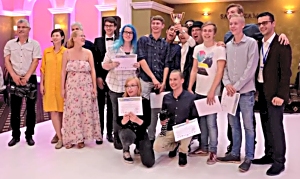
On the other hand a significant success was the Young UNICA workshop. Mainly teenagers, they stayed in a university hostel and worked in rooms that were part of the planetarium. Tutors from Romanian television advised and facilitated their work. The authors helped each other, lent equipment to one another and became friends. They presented a fascinating and varied show on the closing evening and eloquently expressed their delight in joining the UNICA family.
Something Negative
One sour note was sounded by FFCV, the French national
organisation. Alone of all the UNICA nations, they refused to ask
their authors to send signed forms. It seemed there would be no
French films shown, so I contacted a couple of the authors, whose
emails I knew. They responded immediately. At that point – and after
the official closing date – the FFCV did make heroic efforts to
contact their remaining authors, but could not reach them all. We
showed a reduced French programme. In their magazine and on their
website FFCV published a series of complaints about UNICA. They
interpreted our decisions as deliberately hostile to France and as
an attack on the integrity of their federation.
This is absolutely not the case.
Let me make it as clear as possible. Your committee works only for
the good of UNICA. It serves the member nations to the best of its
ability. We made late changes to the competition entry arrangements
on the advice of specialist lawyers. The aim is to protect UNICA
from financial destruction, if there should be a repeat of the
“plagiarism” detected (thanks to FFCV officers) at Fieberbrunn in
2013.
UNICA 2017 in Dortmund
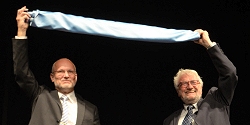
The UNICA flag passed to Germany, where the team from Dortmund
have already got plans for the 2017 Congress well in hand. They
showed films and offered information about it … all of which can be
found in the three UNICA languages at www.erikjaeger.online.de/unica2017/. I
doubt they will offer such colourful folkdances or quite such
enormous meals, but they have many intriguing surprises up their
sleeves. Sign up for the Dortmund email newsletters to keep up to
date.
There is plenty to look forward to at UNICA in the next few years.
2017 in Dortmund (Germany), 2018 in Blansko (Czech Republic), 2019
in the Netherlands. Watch our website!
Please also keep an eye open for young film makers in your country,
who might take part in the workshop programme. It is not essential
that they have a film in your national programme, but if they do,
then UNICA pays half the Congress Card fee for one young author per
country.
A Special UNICA is Over
I felt UNICA 2016 began when that plane landed at nightfall. It was fitting that it ended a week later as dawn rose over the airport and we began our trip home.
Dave Watterson. UNICA President(written September 2016, published October 2016)
